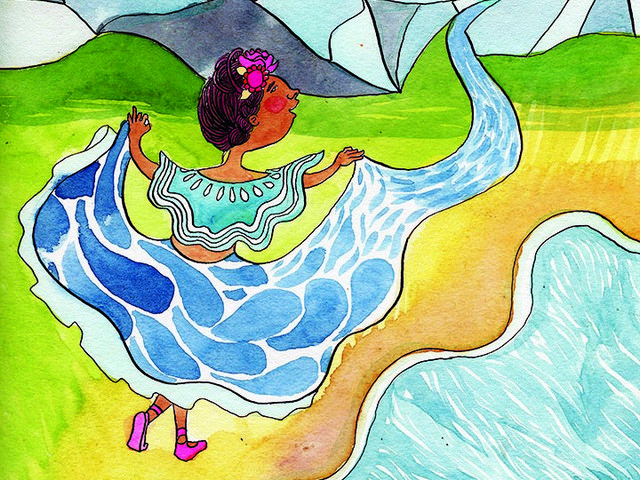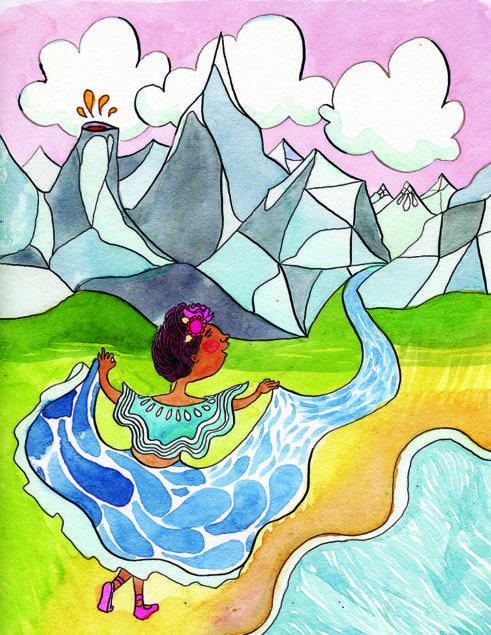After spending a month in the heart of the Andes Mountains, I can see how the inhabitants of this region might forget that the ocean is the defining feature of our planet. Many of the residents I met have never traveled far from home.
A young dancer from Guasca, a small town in the mountains of Colombia, told me about a unique opportunity to participate in the world famous Carnaval de Barranquilla. She and her dance group traveled eighteen hours by bus to take part in the celebration. After the carnival, the group took a detour and spent a couple hours at the beach. Ever since, the young dancer has dreamt of going back. “Don’t get me wrong,” she said. “I love the mountains and lakes. But the ocean is mesmerizing.”
I agreed, and in turn, I told her a little-known fact about the Andes Mountains.
Located in South America, the Andes run along the west coast of the continent, stretching over 4,300 miles from north to south. It is by far the longest aboveground mountain range in the world. However, when we include submarine mountains, the longest mountain range is in fact the mid-ocean ridge system, which extends for about 40,000 miles. That’s over eight times the length of the Andes.
For scientists and educators, it’s revelations such as these that further prove that the ocean is worth exploring, investigating and protecting. This is why, in 2004, these ocean advocates teamed up to draft the 7 Principles of Ocean Literacy—seven essential oceanic concepts that all of us should know.
Principle #1: The Earth has one big ocean with many features.
Principle #2: The ocean and life in the ocean shape the features of Earth.
Principle #3: The ocean is a major influence on weather and climate.
Principle #4: The ocean made Earth habitable.
Principle #5: The ocean supports a great diversity of life and ecosystems.
Principle #6: The ocean and humans are inextricably interconnected.
Principle #7: The ocean is largely unexplored.
What’s not directly stated in these principles (although it’s certainly implied) is that the ocean impacts all living beings. Allow me to put this in perspective.
The ocean supplies oxygen.
Take a breath of air. Now take another one. You can thank the ocean for the second breath.
The ocean absorbs almost half of all carbon dioxide added to the atmosphere. Most of the oxygen in the atmosphere originally came from the activities of photosynthetic organisms in the ocean. This accumulation of oxygen in Earth’s atmosphere was necessary for life to develop and to sustain on land.
The ocean supplies water.
The vast majority of Earth’s water—as much as 97 percent—is in the ocean. Hence, the ocean is an integral part of the water cycle, connected to all of Earth’s water reservoirs via evaporation and precipitation. Likewise, it’s connected to major lakes, watersheds and waterways because all major watersheds drain to the ocean. The ocean also supplies freshwater since most rain comes from—you guessed it—the ocean.
The ocean supplies food.
The ocean has provided us with food since before recorded history, and as civilizations developed, so too did organized fisheries. Since then, we have been making incremental advances in the harvesting of living marine resources—to the point now where we are very likely taking too much. Presently, the ocean is the primary source of food for 3.5 billion people around the globe.
The ocean moderates the climate to allow for life to exist on Earth.
The ocean moderates weather and climate by absorbing most of the solar radiation that reaches Earth. Heat exchange between the ocean and atmosphere can impact patterns of rain and drought. One significant example would be the El Niño Southern Oscillation, which causes critical changes in global weather patterns. Water condensation that evaporates from warm seas provides the energy for hurricanes and cyclones.
The ocean influences you, and you influence the ocean.
Understanding the ocean is more than a matter of curiosity. The ocean provides jobs and sustains national economies. It plays a role in national security. It serves as a highway for the transportation of goods and people. For the young girl in the mountains, the ocean is a source of inspiration. For me and my family, it’s a source of recreation, rejuvenation and discovery. Although the ocean is massive, it is still finite, and its resources are limited. We are all responsible for caring for the ocean. If the ocean sustains life on Earth, allowing us to breath every other breath—then it’s up to us to learn how we can protect and sustain the ocean.
Author’s Bio
Leopoldo Llinas is a forward-thinking father who hopes to educate the young men and woman who will make this world a better place. He holds a PhD in Marine Biology and Fisheries from the University of Miami Rosenstiel School of Marine and Atmospheric Science. leollinas@gmail.com









All of us should gain a better understanding of our oceans, our land and inhabitants of this Earth.